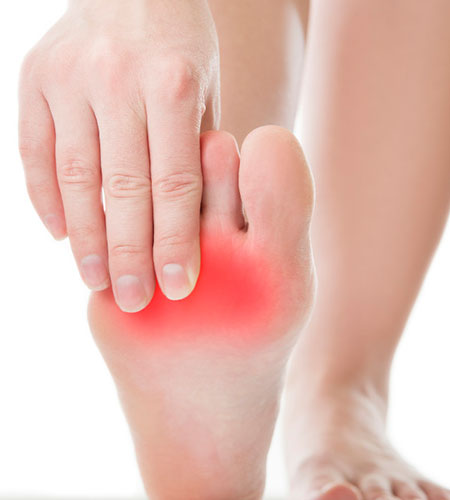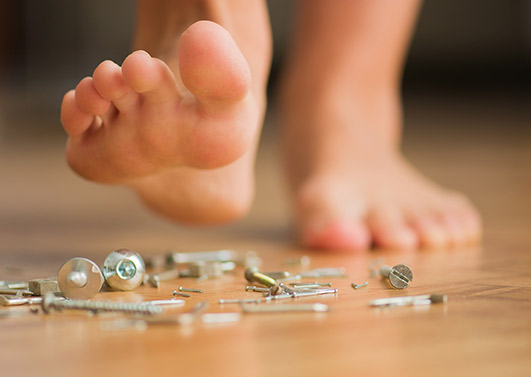Neuropathy Treatment
Stop Letting the Pain and Numbness of Peripheral Neuropathy Control Your Life!
If you are experiencing symptoms of peripheral neuropathy such as numbness, tingling or a lack of feeling especially in your feet, I encourage you to call our office right away and schedule a no-cost consultation and discover how our proven treatment protocols can put an end to your suffering!
In the last few years, the number of patients diagnosed with Peripheral Neuropathy has grown considerably. In fact, it affects almost one in fifty people around the world and an estimated 20 million Americans, a scary number that continues to grow. Usually, this condition affects older people; almost 10% of people who’re over 55 are affected by this condition.
At Georgia Medical Treatment Center, we can help you get your life back without painful surgery or large amounts of prescription pain pills which often only cover up the symptoms and can even make things worse.

What is Peripheral Neuropathy?
Peripheral neuropathy is described as damage to one or more of the peripheral nerves that connect the spinal cord and brain. This means that the messages that travel between the central and peripheral nervous systems are disrupted or even severely limited. Peripheral neuropathy affects the limbs, i.e. arms, hands, legs, and feet. Patients suffering from this disease may experience numbness, tingling, weakness, unusual sensations or pain in affected areas. Most of the time, symptoms of this disease are symmetrical and occur in both feet and hands.
Contrary to the common notion, this disease can involve many different types of nerves, including sensory, motor and autonomic. It can also be easily categorized according to the size of the nerve fibers which are involved, small or large.
What Causes Peripheral Neuropathy?
In most parts of the world, Type 1 and Type 2 Diabetes are the most common causes of this condition. Over a period of time, elevated blood sugar levels associated with any type of diabetes may cause damage to nerves. Such damage is called diabetic polyneuropathy. According to recent reports and researches, around one in every five diabetics suffers from diabetic polyneuropathy.
Besides diabetes, Peripheral Neuropathy can also develop from a variety of different conditions that affect the body’s immune system. For instance, it may be caused by HIV, Herpes Zoster (commonly known as shingles), and other viral infections, as well as metabolic change and imbalance of the nerves tissues. The nerve tissues are vulnerable to infections, which makes it difficult for the body to transform nutrients into energy.
There are more than a hundred types of peripheral neuropathy that have been identified in different patients, each revealing different types of symptoms as well as patterns of development. Impaired function of nerves depend on the kind of damaged the immune system is suffering from. Some patients may experience numbness, tingling, and/or pricking sensations, along with sensitive touch and weakness of the muscles. Sometimes, this condition is also a side effect of medication.
Who is Affected by Peripheral Neuropathy?
Neuropathy can affect anyone, both the young and the old, but it typically affects older adults. Regardless of age, people suffering from diabetes and other infections have a high possibility of developing this illness. Seventy percent of people suffering from diabetes end up being diagnosed with peripheral neuropathy as well, due to high content of glucose in the body.
Symptoms
Symptoms of Peripheral Neuropathy mainly depend on the particular nerve that has been damaged. Symptoms of this condition also depend on whether a single or multiple nerves have been damaged. Some of the common symptoms include:

Pain & Numbness – Painful burning and tingling in the legs and arms can be an early sign of this condition. Usually, such feelings start in your feet and toes. You may suffer from a lot of pain and over a period of time, you may even lose feeling in your arms and legs. Due to this, you may be unable to feel any sensations when you step on something sharp. Similarly, you may not be alerted when you touch something too cold or hot. You may also be unaware of any sores or blisters on either of your feet.
Muscular Problems – With nerve damage, it can be very hard to control your muscles. Thus, you may be experiencing more weakness than before. You may even be unable to move a particular part of your body with the ease you used to have. Tripping over your own toes may also be likely if you have damage in the muscles of your feet; and tasks like buttoning your shirt may be harder if the muscles in your hands have suffered from nerve damage. People suffering from this condition also notice muscle cramps or twitches. After some time of suffering from peripheral neuropathy, your muscles tend to become smaller as well.
Problems Associated with Body Organs – People suffering from this condition have a lot of problems digesting food. They tend to feel bloated or full after a meal or may experience heartburn shortly after eating. Sometimes, people suffering from Peripheral Neuropathy vomit when the food has not been digested properly. Patients may also have difficulty swallowing.
If nerves around your heart have been damaged, you may feel faint or lightheaded whenever you stand up. It is also worth mentioning that nerve damage in this area may hide Angina pain, which is considered to be a warning sign for heart attack and heart disease.
There are also many other symptoms of Peripheral Neuropathy, which depend on the severity of your condition and the types of nerves that have been damaged. They may be physical, stress related or sexual in nature and may even cause depression.
Why Suffer any Longer?
Book an Appointment Today to Get Your Personal Evaluation!
Our Non-Surgical Treatment Options Can Provide A Long-Lasting Relief You Deserve
Our goal for the treatment for peripheral neuropathy is to treat any underlying cause, to control your symptoms, and to help you to achieve maximum independence. By determining the cause of the nerve damage, we can develop the most efficient treatment program to relieve your pain and suffering while reducing the symptoms. There are a number of tests that can be administered by our medical staff determine the amount of damage that has been done to the nervous system. Based upon the results we offer a variety of non-surgical, drug free, treatment options that have been proven to reduce, and even eliminate, the symptoms associated with peripheral neuropathy.
There is Hope!
Our highly effective non-surgical, drug free treatment protocols include:
Nerve Block Injections – For those suffering from burning, tingling, and pain associated with peripheral neuropathy in the arms, legs, hands, or feet there are a variety of nerve block injections that may be able to provide relief.
We utilize the latest medical imaging devices to pinpoint and visualize the damaged nerves inside your body. Once targeted, an anesthetic (such as Lidocaine) is administered to the nerve root effectively blocking the transmission of the faulty nerve signals. This results in a reduction of pain and other symptoms. Repeated injections can permanently reduce the ability of the nerve to transmit pain signals and provide lasting relief.
Electrical Anesthesia – Sometimes utilized in conjunction with nerve block injections, or provided stand alone, electrical anesthesia may also reduce or eliminate the painful symptoms associated with peripheral neuropathy.
Electrical Anesthesia is administered via a device that generates an electrical signal which the peripheral nerves are sensitive to. By adjusting the intensity and frequency of this signal the clinician can systematically desensitize the affected nerves.
Rebuilder Therapy – Another effective treatment for peripheral neuropathy, especially in those suffering from numbness and sensory loss is Rebuilder Therapy. This electrical device may be administered utilizing a foot bath or conductive glove or sock. By sensing each patients specific nerve firing patterns, or misfires, and providing corrective pulses the body’s nerves can be retrained to function normally once more. This therapy can be administered in office and also via a portable home use model.
Physical Therapy – Therapy can also be quite helpful in treating this condition. By engaging in meaningful therapeutic exercises specifically designed for those suffering from neuropathy areas of the body that have become weak or lost function may be strengthened and returned to normal. Our physical therapy department utilizes the latest therapeutic technologies to assist our patients and all therapies are supervised and administered by our highly qualified staff of healthcare providers.
We utilize a combination of these treatments as well as others are designed to address each patient’s specific condition to maximize positive clinical outcomes.
What About Prescription Drugs?
Some medications used for treating depression or seizures can also be used for treating pain associated with Peripheral Neuropathy. These medications can help reduce some pain in your legs, feet and arms. However, they are unable to bring back any sensation or feeling which has already been lost.
For this reason, and because these drugs all come with potential risks and side effects, we have placed an emphasis on developing a drug-free treatment protocol for those suffering the debilitating effects of peripheral neuropathy that is also designed to return normal function and improve the quality of life of our patients.

Finally experience relief from neuropathy and peace of mind!
Treatment for diabetic or peripheral neuropathy includes the administration of safe, effective injections, and care unique and individualized to every patient. Neuropathy can also be associated with chemotherapy, statins and/or other medications, chronic fatigue, or fibromyalgia and is often misdiagnosed.
